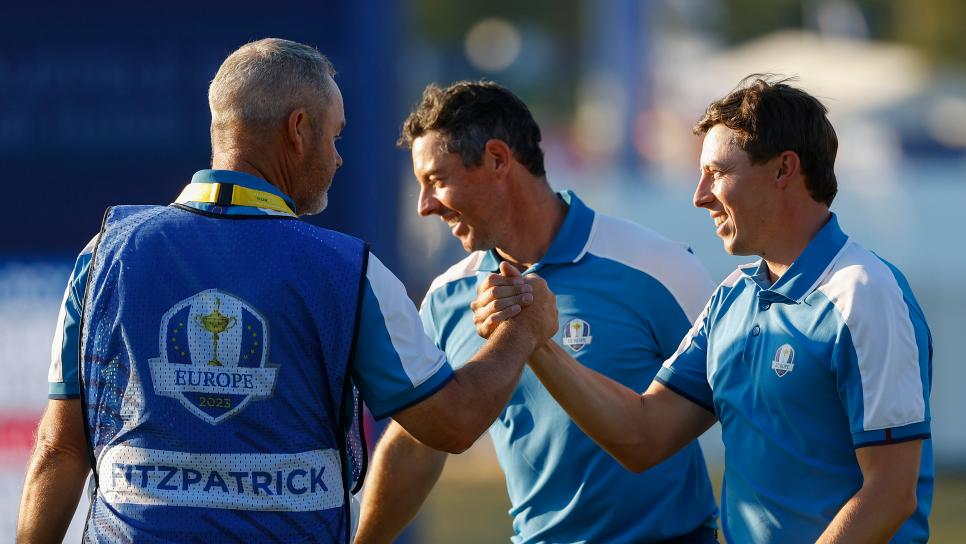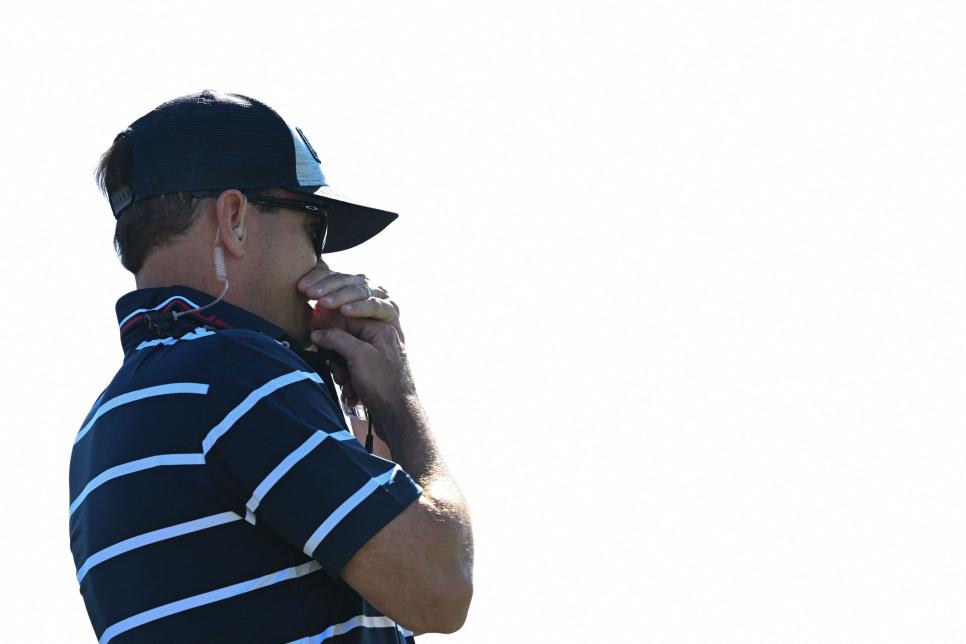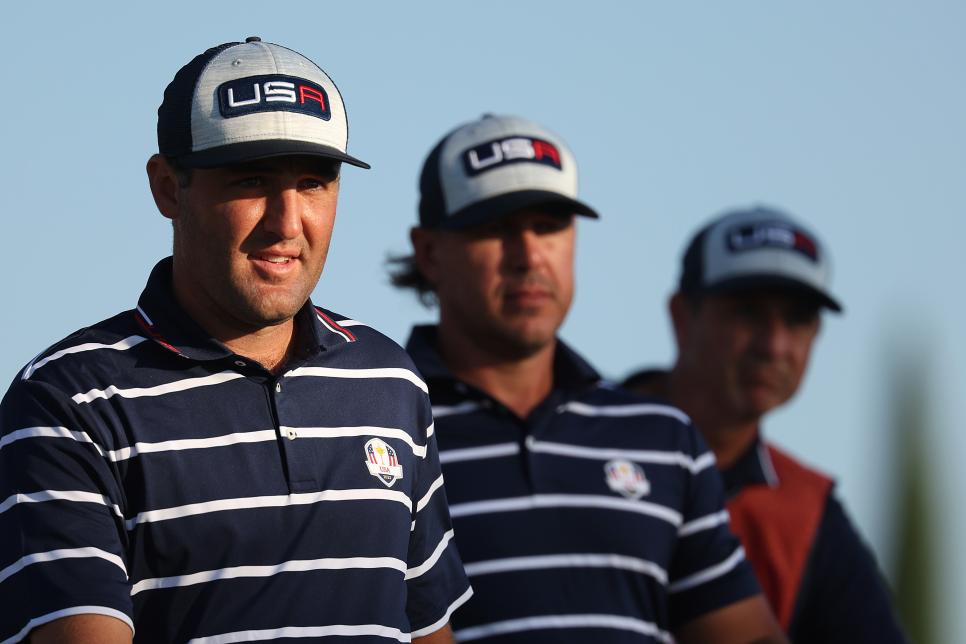The morning was a rout, the afternoon looked like a rebound but ended in a whimper, and the final tally for Friday’s opening sessions goes 6.5-1.5 to Europe. Now, we look to the leadership. Where did Zach Johnson and Luke Donald play 3D chess, and where did they whiff?
We’ll start with the Europeans.
What Luke Donald got right
1. It’s hard to find anything he did wrong after amassing that huge lead, but he especially aced the rookie partnerships. Incorporating the rookies into the line-up is a delicate art, influenced by statistics but mostly by personality. And everywhere you looked, he picked the right sherpa.
Viktor Hovland ushered Ludvig Aberg into the mix, and Aberg spoke after their 4&3 win about how comfortable it felt, and how reassuring to speak their own languages (Hovland spoke Norwegian, Aberg Swedish, but they understood each other perfectly). Shane Lowry was a perfect emotional match for Sepp Straka, and they spent their match laughing all the way to a win. In the afternoon, Jon Rahm’s steady hand infused Nicolai Hojgaard with early confidence, and for the front nine, he was (along with Matt Fitzpatrick) the best player on the course. Nerves struck late, but that’s when Rahm stepped up to ensure a half. And finally, Justin Rose and his rookie charge Robert MacIntyre somehow eked out a half despite looking overmatched, and though MacIntyre’s game was slightly rough (you shouldn’t expect him to play on Saturday), the fact that Donald got him in the line-up without losing a point was an incredible coup. Afterwards, Rose said the partnership had been in the works for weeks, another nod to Donald’s preparation.
2. He figured out how to handle Rory McIlroy. It’s been of the great puzzles for recent European captains—McIlroy’s .500 record in the Ryder Cup even led Paul McGinley to call him out on Golf Channel—and Donald knew he couldn’t afford another Rory disappointment like Whistling Straits. So he drew up partnerships with Tommy Fleetwood in the morning and Matt Fitzpatrick in the afternoon, and it worked beautifully both times. And oh, by the way, in the process he also managed to get the Ryder Cup-cursed Matt Fitzpatrick his first win. He and Rory were perfect for each other, but it took Donald and his vice–captains to spot it. “You just feel, even if you hit a bad shot, a guy like Rory next to you is going to save you.” Interestingly, Fitzpatrick said in his press conference that he’s always preferred to play four-ball, but has always played foursomes in his past Ryder Cups. He told Luke Donald that four-ball was his overwhelming preference, and Donald made it known that he planned to play him in that session. Fitzpatrick credited his communication.

3. He stuck to his plan to get all 12 players in action on Friday. Granted, sticking to your plan is a little easier when you win the first session in a clean sweep, but by the same token, there must have been a slight temptation to keep players like MacIntyre or even Hojgaard on the bench in order to keep the rout going. But he was wise enough to see the benefit in getting everyone out there, and that benefit is three-fold—you see everybody’s form, you make sure nobody is cold going into singles, and you get other players necessary rest on a course that is challenging for its hilly terrain and hot weather.
4. He clearly had his players ready to fight. The Europeans played three-hole matches during the practice rounds to emphasise getting out to quick leads, and that paid off in the morning, but in the afternoon they needed to come back from deficits in the first three matches to steal halves when losses looked likely. That kind of resilience speaks, again, to preparation.
What Luke Donald got wrong
1. Uhhhhh… his side didn’t win all eight matches?
2. Hold on…
3. [This content empty]
4. Seriously, I don’t know. The only thing you can possibly reach towards is playing MacIntyre, whose strokes-gained numbers were second-worst of the session, instead of someone like Aberg, but again, getting players some rest and still managing half a point from that match is huge, and this nitpick, on close examination, actually looks pretty smart.
What Zach Johnson got right

1. OK, we’re going to have to be a little generous here. Obviously, this is not how he saw this going, how he hoped it would go, how he wanted it to go, and he implied in his press conference that there were health issues that forced his hand in several regards. But what we can say right away is that he came out with three strong partnerships in foursomes in the first, second and fourth matches.
2. I also personally liked that he rested Jordan Spieth and Justin Thomas until the afternoon. Those two are 4-0 lifetime in four-ball sessions, but only 4-2 in foursomes. So why not rest Thomas in particular, since he was sure to have a glaring spotlight on him due to the controversy surrounding his inclusion, and also have your top pair playing in their best format? It made sense from every angle, and the irony is that Spieth—the worst player by strokes gained on either team—was the one most directly to blame for not taking a full point from their four-ball match.
3. There’s a certain boldness in putting your top player, Scottie Scheffler, in the leadoff spot. It communicates belief, and anything less than that when you have the literal No.1 player in the world comes off as passive and weak. I didn’t quite realise it until it happened, but it felt like he had to do it.
4. His message to his team on Friday night, as relayed to the media—today is done, forget it, come back tomorrow to show your true character, our time is coming—is about as good as it could have been under nearly impossible circumstances.
What Zach Johnson got wrong
1. The Rickie Fowler–Collin Morikawa foursomes pairing felt weird from the start, but let’s allow that one to pass, since for all we know the statistical models loved it. What makes less sense is trotting Morikawa out for the afternoon. He was the worst player by strokes gained in the morning session, he looked truly woeful and even discouraged, and it should come as no surprise that he was near the bottom in the afternoon too and seemed to drag Xander Schauffele down with him. That Morikawa–Schauffele pairing looked like a loss from the start, and it was almost over before it started.
2. If you believe Paul McGinley, who spoke on Golf Channel, it was a mistake from an organisational standpoint to have most of his players compete in literally no professional events for the weeks leading up to the Ryder Cup. The irony here is that speculation before the Cup started hinged on whether the Europeans’ relatively busy schedule would leave them tired; instead, you can make a great argument that the Americans were rusty. They certainly looked it.

3. He has not figured out Scheffler. Steve Stricker used Scheffler in a limited role at Whistling Straits that worked beautifully, but that was before Scheffler became the best player in the world. It’s not possible to do that anymore, which means it was on Johnson to solve the riddle of how to set him loose. Scheffler had a rough Presidents Cup last year, and Johnson’s first idea was to give the Scheffler–Sam Burns pairing from Quail Hollow another try; he even made Burns a captain’s pick with that in mind. It didn’t work, and yet again the two were uninspiring together. In the afternoon, he paired Scheffler with Brooks Koepka, and things went better. They were unlucky not to beat Rahm and Hojgaard, who took turns burying a series of ridiculous chips and putts, and maybe Koepka is the answer. But the fact remains that he had the best player in the world at his disposal, and he came out with just half a point in two matches.
4. The team simply looked flat. It may seem harsh to place the blame for that on Johnson’s shoulders, but then again, who else but the captain gets that accountability? From the very start of play in the morning, it was a slow bleed leading to a disastrous start, and when the rubber met the road in the afternoon and his team had a chance to fight back into a competitive position, they lost the 18th hole three straight times. It will probably take time before we know if this was bad luck, poor planning, poor play or poor leadership—it might be a confluence of them all—but being in charge means taking responsibility when your team isn’t ready for the moment. Like it or not, that’s on Johnson’s shoulders right now.
MORE FROM GOLF DIGEST @ THE RYDER CUP
• • •
This article was originally published on golfdigest.com

